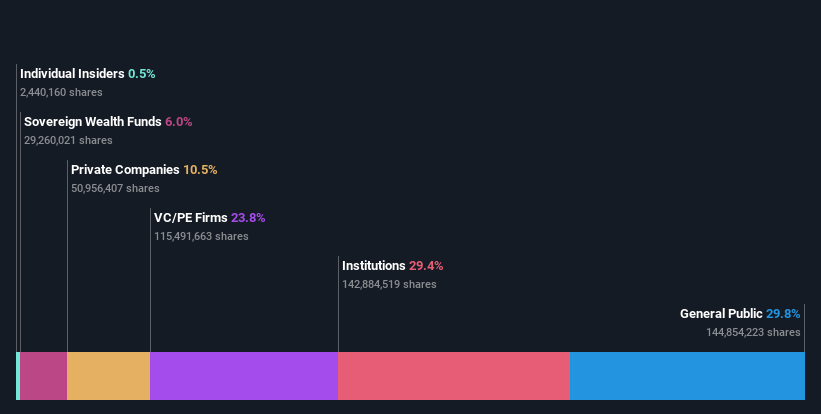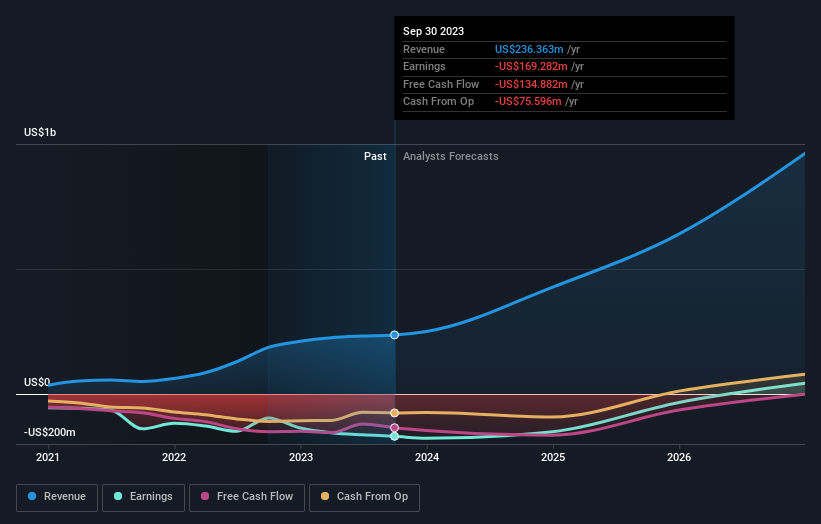- United States
- /
- Aerospace & Defense
- /
- NasdaqCM:RKLB
Both retail investors who control a good portion of Rocket Lab USA, Inc. (NASDAQ:RKLB) along with institutions must be dismayed after last week's 23% decrease

Key Insights
- Significant control over Rocket Lab USA by retail investors implies that the general public has more power to influence management and governance-related decisions
- A total of 6 investors have a majority stake in the company with 51% ownership
- Insiders have sold recently
If you want to know who really controls Rocket Lab USA, Inc. (NASDAQ:RKLB), then you'll have to look at the makeup of its share registry. We can see that retail investors own the lion's share in the company with 30% ownership. That is, the group stands to benefit the most if the stock rises (or lose the most if there is a downturn).
While the holdings of retail investors took a hit after last week’s 23% price drop, institutions with their 29% holdings also suffered.
In the chart below, we zoom in on the different ownership groups of Rocket Lab USA.
See our latest analysis for Rocket Lab USA

What Does The Institutional Ownership Tell Us About Rocket Lab USA?
Institutional investors commonly compare their own returns to the returns of a commonly followed index. So they generally do consider buying larger companies that are included in the relevant benchmark index.
As you can see, institutional investors have a fair amount of stake in Rocket Lab USA. This can indicate that the company has a certain degree of credibility in the investment community. However, it is best to be wary of relying on the supposed validation that comes with institutional investors. They too, get it wrong sometimes. When multiple institutions own a stock, there's always a risk that they are in a 'crowded trade'. When such a trade goes wrong, multiple parties may compete to sell stock fast. This risk is higher in a company without a history of growth. You can see Rocket Lab USA's historic earnings and revenue below, but keep in mind there's always more to the story.

Rocket Lab USA is not owned by hedge funds. Khosla Ventures, LLC is currently the largest shareholder, with 15% of shares outstanding. In comparison, the second and third largest shareholders hold about 10% and 8.4% of the stock.
We also observed that the top 6 shareholders account for more than half of the share register, with a few smaller shareholders to balance the interests of the larger ones to a certain extent.
While it makes sense to study institutional ownership data for a company, it also makes sense to study analyst sentiments to know which way the wind is blowing. Quite a few analysts cover the stock, so you could look into forecast growth quite easily.
Insider Ownership Of Rocket Lab USA
The definition of an insider can differ slightly between different countries, but members of the board of directors always count. Management ultimately answers to the board. However, it is not uncommon for managers to be executive board members, especially if they are a founder or the CEO.
I generally consider insider ownership to be a good thing. However, on some occasions it makes it more difficult for other shareholders to hold the board accountable for decisions.
Our data suggests that insiders own under 1% of Rocket Lab USA, Inc. in their own names. We do note, however, it is possible insiders have an indirect interest through a private company or other corporate structure. Keep in mind that it's a big company, and the insiders own US$9.7m worth of shares. The absolute value might be more important than the proportional share. It is good to see board members owning shares, but it might be worth checking if those insiders have been buying.
General Public Ownership
With a 30% ownership, the general public, mostly comprising of individual investors, have some degree of sway over Rocket Lab USA. This size of ownership, while considerable, may not be enough to change company policy if the decision is not in sync with other large shareholders.
Private Equity Ownership
With a stake of 24%, private equity firms could influence the Rocket Lab USA board. Some might like this, because private equity are sometimes activists who hold management accountable. But other times, private equity is selling out, having taking the company public.
Private Company Ownership
We can see that Private Companies own 10%, of the shares on issue. It's hard to draw any conclusions from this fact alone, so its worth looking into who owns those private companies. Sometimes insiders or other related parties have an interest in shares in a public company through a separate private company.
Next Steps:
It's always worth thinking about the different groups who own shares in a company. But to understand Rocket Lab USA better, we need to consider many other factors. Consider risks, for instance. Every company has them, and we've spotted 3 warning signs for Rocket Lab USA you should know about.
If you are like me, you may want to think about whether this company will grow or shrink. Luckily, you can check this free report showing analyst forecasts for its future.
NB: Figures in this article are calculated using data from the last twelve months, which refer to the 12-month period ending on the last date of the month the financial statement is dated. This may not be consistent with full year annual report figures.
New: AI Stock Screener & Alerts
Our new AI Stock Screener scans the market every day to uncover opportunities.
• Dividend Powerhouses (3%+ Yield)
• Undervalued Small Caps with Insider Buying
• High growth Tech and AI Companies
Or build your own from over 50 metrics.
Have feedback on this article? Concerned about the content? Get in touch with us directly. Alternatively, email editorial-team (at) simplywallst.com.
This article by Simply Wall St is general in nature. We provide commentary based on historical data and analyst forecasts only using an unbiased methodology and our articles are not intended to be financial advice. It does not constitute a recommendation to buy or sell any stock, and does not take account of your objectives, or your financial situation. We aim to bring you long-term focused analysis driven by fundamental data. Note that our analysis may not factor in the latest price-sensitive company announcements or qualitative material. Simply Wall St has no position in any stocks mentioned.
About NasdaqCM:RKLB
Rocket Lab USA
A space company, provides launch services and space systems solutions for the space and defense industries.
Exceptional growth potential with adequate balance sheet.
Similar Companies
Market Insights
Community Narratives



